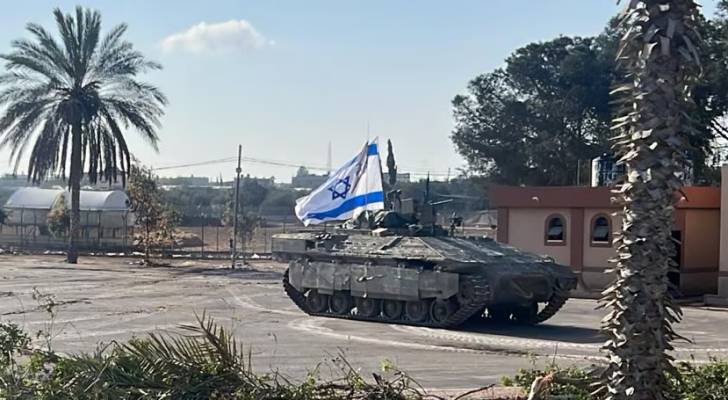"Israeli" tanks roll in to the Rafah Border Crossing , May 2024 (Credit: Israeli Occupation Forces)
Palestinian Authority role complicates Rafah Border Crossing talks
A report published today in the Saudi newspaper Asharq Al-Awsat highlighted ongoing challenges in managing the Rafah Border Crossing between Egypt and Gaza.
Disagreements remain over the Palestinian side’s control, with “Israel” insisting on maintaining security oversight. Meanwhile, Egyptian and Palestinian sources indicated progress in agreeing to the Palestinian Authority's (PA) role in managing the crossing.
Ahmad Majdalani, a member of the Executive Committee of the Palestinian Liberation Organization (PLO), confirmed to Asharq Al-Awsat that an agreement was reached in Cairo a few days ago with representatives from Egypt, Palestine, and “Israel”.
The agreement reinstates Palestinian crossing authority and security personnel under the 2005 Agreement on Movement and Access, with international observers resuming their presence at the crossing.
Majdalani revealed that a recent meeting took place between European Union (EU) representatives and the Secretary General of the Executive Committee of the PLO Hussein Al-Sheikh to finalize logistical arrangements for reopening the crossing and reintroducing EU monitors.
Historical context
The 2005 Agreement on Movement and Access, signed by the PA and “Israel”, included EU involvement as a third party to ensure security and transparency. The agreement stipulated mutual notifications about crossing individuals and routine trilateral customs meetings involving Palestinians, “Israelis”, and Egyptians.
“Israeli” stance and control
“Israel” seized the Palestinian side of the Rafah crossing last May, destroying parts of it, and demanded permanent representation at the crossing—a proposal Egypt rejected.
“Israel's” Prime Minister Benjamin Netanyahu's office issued a statement contesting reports about the PA’s control, claiming its involvement is limited to stamping passports as per existing international arrangements.
The statement clarified that “Israeli” military forces and intelligence maintain oversight and only non-Hamas Gazan residents vetted by “Israeli” security manage technical operations under EU monitoring.
Palestinian Authority and Egyptian rejection
Majdalani emphasized that “Israeli” soldiers would withdraw from the crossing under the Cairo agreement. However, for medical evacuations, “Israel” must preapprove the names of individuals exiting Gaza. He noted that previous offers undermining PA authority at the crossing were rejected. The PA is expected to resume its full role after the ceasefire's first phase, which involves prisoner and captive exchanges.
Egypt’s role
The report stated that Egypt has rejected “Israeli” proposals for maintaining a military presence at Rafah and emphasized returning control to the PA. President of Egypt Abdel Fattah El-Sisi reaffirmed Egypt's commitment to implementing the ceasefire, restoring Gaza's viability, and opposing forced displacement.
Humanitarian Aid
Efforts to deliver aid to Gaza continue, with 300 trucks entering yesterday through Rafah, bringing the total to 1,290 trucks since the ceasefire began, in addition to UN-coordinated shipments through other crossings.




